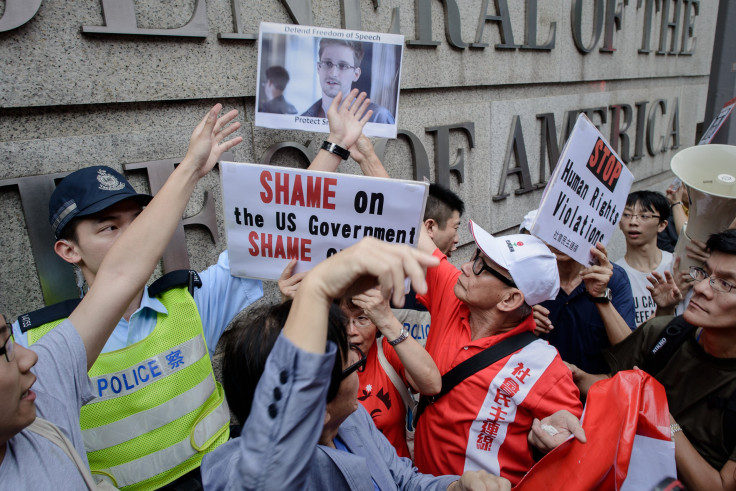Edward Snowden: NSA, FBI Were Aware Of DNC Hackers

Edward Snowden says his efforts to increase public debate about government mass surveillance programs are working, and that if given a second chance, he would leak the 1.5 million classified documents all over again.
The former CIA employee, NSA contractor and notorious leaker spoke with Der Spiegel in a wide-ranging interview from a Moscow hotel. Snowden, 34, has become a flashpoint in the debate over privacy, civil liberties and the "War on Terror," with political figures in the U.S. both lionizing him as a whistleblower and others denouncing him as a traitor. Snowden focused on specific improvements he’s seen in encryption, a narrowing of the NSA’s dragnet policies and he calls reports that he demanded asylum in Germany as an outright “lie.”
Snowden doubled down on his belief that none of the information he got published helped criminals, rogue states or terrorists. Snowden said the accusation that such individuals benefited by learning how intelligence agencies work is a “comfortable allegation” from governments across the globe.
“Their basis for classifying this information is to say it will cause harm if it is revealed. I have sent lunch plans from the cafeteria that are classified as top secret. I'm not kidding,” he said. “I came forward in 2013. We are now in 2017 and they have never shown any harm despite being asked by Congress and despite having spent more than two years investigating it.”
Snowden also addressed the potential political scandal involving Russian hackers, Hillary Clinton and the 2016 U.S. presidential election. He says that while such meddling has likely “always happened,” we now have enough transparency to know the U.S. conducts the exact same tactics with other countries. In regards to Russia, Snowden says the NSA almost certainly knew who the Russian hackers were and when they intruded into the DNC emails and servers.
“They probably did hack the systems of Hillary Clinton's Democratic Party, but we should have proof of that. In the case of the hacking attack on Sony, the FBI presented evidence that North Korea was behind it. In this case they didn't, although I am convinced that they do have evidence,” he said.
“I think the NSA almost certainly saw who the intruders were. Why wouldn't they?” continued Snowden. “The Democratic National Committee is a big target and apparently their security wasn't very good. The DNC refused to provide these servers to the FBI, which is really weird.”
Snowden reiterated throughout the interview that there is still no proof that mass surveillance programs are stopping terrorist attacks. Instead, he argues that civilians and completely irrelevant conversations end up getting caught in the wide U.S. intelligence dragnet.
“Since summer 2013, the public has known what was until then forbidden knowledge. That the U.S. government can get everything out of your Gmail account and they don't even need a warrant to do it if you are not an American but, say, a German,” said Snowden.
“You are not allowed to discriminate between your citizens and other peoples' citizens when we are talking about the balance of basic rights. But increasingly more countries, not only the U.S., are doing this. I wanted to give the public a chance to decide where the line should be,” he added.
Snowden said the agencies are rightly focusing their efforts on bypassing encryption – a process that former U.S. Director of National Intelligence James Clapper said he accelerated by seven years.
“Not cracking encryption -- the agencies are trying to bypass the encryption,” said Snowden. “They are looking for weak points on the device you use to see what you are writing before you encrypt your message. What they actually do is take over a website, infect it with a malicious software, and when you visit that website because, for example, you received a link, you get hacked. Then they own your computer or your phone. You paid for it, but they use it. I think this is far better than mass surveillance.”
Snowden cautioned about the merging of companies such as Google and Facebook merging with the government on surveillance, even noting that Mark Zuckerberg's potential presidential ambitions should be worrisome to free speech advocates.
"I think this is where it gets quite dangerous, when we say: Google, you are the sheriff of the internet now. You decide what the law is," said Snowden. "Do we want the company [Facebook] that has the largest social media presence on earth and has clear political ambitions, to start deciding what is permissible political speech and what is not?
Although Snowden said he is “pessimistic” about other whistleblowers emerging due to the risk of punishment, he said he was hopeful that younger people care far more about privacy than older generations.
© Copyright IBTimes 2024. All rights reserved.











